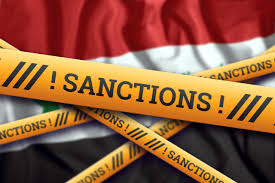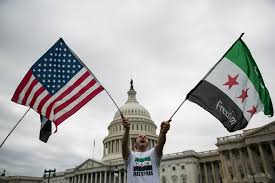
Syria Sanctions
Faced with restrictions or at risk of violating the sanctions regime against Syria? Our law firm will help you navigate the complex requirements of international law and regulators in different countries. We provide consultations on current restrictions, assess risks, and offer strategies to protect your business and reputation. Trust the expertise of our specialists and receive a reliable solution in the constantly changing sanctions regime.

The Reasons Behind Syria’s Sanctions
Sanctions against Syria represent one of the longest-lasting and multifaceted systems of restrictive measures in the Middle East. Over the past decades, various unilateral as well as multilateral restrictions have been imposed on the Syrian state and individuals within the country, initiated by the United States, the European Union, as well as a number of other states and international organizations.
Sanctions against Syria date back to 1979, when the United States included the country in the list of state sponsors of terrorism. Further support by Syrian authorities for various groups, including the Lebanese “Hezbollah,” heightened the international community’s concerns about Syria’s role in destabilizing the Middle East region.
The most important factor that led to the expansion of sanctions was the human rights situation in Syria. Starting in 2011, when mass protests erupted in the country, the Syrian authorities faced criticism from the international community for their methods of suppressing civilian demonstrations. Reports of systematic human rights violations, including the use of violence against peaceful residents and political opponents, served as the basis for the introduction of a series of sanction measures.
Moreover, investigations by international organizations confirmed the use of substances prohibited by the Chemical Weapons Convention on Syrian territory. These events led to the adoption of additional restrictive measures, including the freezing of assets and restrictions on the supply of technologies and materials potentially used in the production of weapons of mass destruction.
Syria Sanctions after the civil war
The civil war that began in 2011 became one of the most destructive conflicts of modern times. The country plunged into a years-long confrontation between various factions, government forces, opposition movements, and radical organizations.
Since the beginning of the armed conflict, the Syrian authorities have been repeatedly accused of human rights violations, using violence against civilians, and suppressing opposition protests. This became the basis for the international community to impose new sanctions, including freezing of assets state structures and individual high-ranking officials.
The civil war in Syria has taken on an international character, as major geopolitical players such as Russia, Iran, Turkey, as well as various regional groups, have become involved. Mutual accusations and the use of Syria as a platform for achieving their own strategic goals have led to the introduction of a new package of sanctions aimed at restricting financing and supplies related to the military needs of the Syrian side.
Sanctions on Syria after Turkey–Syria earthquake

In February 2023, Turkey and Syria were struck by a massive earthquake that claimed the lives of tens of thousands of people. This tragedy not only exacerbated the humanitarian crisis in the region but also made the global community consider easing a number of restrictive measures imposed on Syria.
OFAC issued a special general license allowing certain financial transactions and the delivery of goods for humanitarian purposes. This measure is time-limited and applies only to transactions directly related to disaster relief efforts.
Some humanitarian organizations were urgently allowed to make bank transfers through chains of financial institutions that were previously blocked.
Temporary licenses and simplified procedures allowed international companies and charitable organizations to respond more quickly to the needs of affected regions.
OFAC Syria Sanctions
OFAC is a division of the U.S. Department of the Treasury responsible for developing and implementing sanctions against foreign states, organizations, and individuals. Among the key areas of OFAC’s work are Syria sanctions, covering a wide range of financial and trade operations.
Executive Order 13338 (2004) served as the basis for the introduction of the first significant restrictive measures, including the blocking of assets and prohibitions on transactions with a number of Syrian organizations.
Executive Orders 13572, 13573, 13582 (2011 and onward) expanded the list of individuals and companies subject to asset freezes, imposed restrictions on Syria’s oil industry, and prohibited the import and export of certain goods.
The Caesar Syria Civilian Protection Act (2020) provides for secondary sanctions against any legal entities and individuals directly or indirectly interacting with the Syrian government and its associated structures (including the energy, construction, engineering, and military services sectors).
OFAC has the right to impose sanctions on those companies (in any country in the world) that conduct business with Syrian individuals and organizations from the sanctions lists. This is an especially serious risk factor for international business, as many firms do not have direct ties to the United States but are forced to comply with American legal requirements to avoid the blocking of their accounts and assets.
Particular attention is paid to the oil and gas industry, construction projects, and the financial sector. Any operations or investments in these areas may require special authorization from OFAC.
The Main Provisions of Syrian Sanctions
Established regarding Syria sanctions programs OFAC they form a comprehensive regime affecting a wide range of economic operations. This is one of the longest and strictest systems of restrictions established by the global community. Their initiators include both individual states and supranational organizations.
Export and Import Restrictions
Strict export controls have been introduced on any products that can be used for military purposes or to suppress the civilian population. The ban includes not only weapons and ammunition but also surveillance equipment, high-tech goods, and software capable of tracking or controlling communications.
Some countries (USA, EU, United Kingdom) have introduced a full or partial ban on the import of crude oil from Syria and the supply of equipment related to the extraction or processing of oil resources back to the country.
Apart from the oil and gas industry, export and import are restricted in the fields of technology, electronics, telecommunications, and a number of industrial components necessary for the modernization of enterprises connected to Syria’s public sector.
International companies planning shipments to or from Syria are required to undergo additional checks and obtain special licenses. Banks and other financial institutions often refuse to work with Syrian partners, fearing secondary sanctions from the US or the EU.
Financial Measures and Asset Freezing
Within the framework of U.S. Presidential Executive Orders, as well as OFAC regulations, all assets of Syrian state institutions and associated legal entities under U.S. jurisdiction are frozen. Similar measures are applied in the EU and the United Kingdom.
Companies and individuals subject to sanctions legislation (including foreign organizations conducting transactions in dollars) are prohibited from transferring funds or carrying out other financial operations in the interests of Syrian sanctioned persons and entities.
The Caesar Act expanded the impact on foreign companies that may face sanctions if they cooperate with Syrian entities from the blacklist.
Sanctions in the Energy Sector
The ban applies to technological solutions and infrastructure used in oil and gas exploration and production, as well as in the processing and transportation of energy resources.
Foreign companies are prohibited from financing or participating in projects related to Syria’s energy sector, including purchasing shares in local energy firms.
Any transactions involving the purchase of Syrian oil or the export of petroleum products produced in Syria are considered high-risk and require special permits. As a result, there is a decrease in the flow of foreign investments into the Syrian energy sector and the associated decline of the industry.
Personal Sanctions and Travel Bans
Leaders of Syrian state bodies, military commanders, businessmen, politicians, as well as their close associates may be included in the SDN List. The assets of such individuals are frozen, and transactions with them are prohibited.
Personal sanctions include a ban on entry to the USA, the EU, the United Kingdom, and some other countries.
Legal entities and individuals are prohibited from negotiating and entering into agreements with those on sanction lists. The only exceptions are limited cases of a humanitarian or medical nature.
Protection of Cultural Heritage
International legal acts and corresponding sanction regimes contain provisions prohibiting the illegal export and sale of historically significant objects, artifacts, and works of art from Syria.
Special control mechanisms have been introduced by UNESCO and several other organizations to prevent the leakage of cultural assets and their entry into the black market.
The sale or purchase of illegally exported cultural heritage items from Syria is prosecuted by law in most developed countries.
Participation in transactions involving suspicious goods (archaeological finds, works of art, etc.) threatens large fines and criminal cases if it is proven that the items were exported from Syria in violation of the law.
Syria General License
Even under strict sanctions, general licenses are provided, allowing certain types of operations to be carried out without violating sanction requirements.
General Licenses OFAC they are publicly published documents that permit certain types of operations or transactions without the need to obtain additional special permission. They contain clear conditions, limitations, and reporting requirements that all participants in the operation must comply with.
General licenses allow companies and organizations to:
- Conduct humanitarian operations, including delivering food and medical supplies;
- Provide medical services or supply medical equipment;
- Provide access to certain communication technologies not intended for military purposes;
- Engage in the supply of agricultural products that meet the criteria of “humanitarian aid”;
- Participate in educational programs in a remote format (if this is included in the list of permitted categories).
General licenses have a specific purpose. All operations must strictly correspond to the specified categories. Using the license for other purposes may be considered a sanctions violation.
Even with the presence of a General License, transactions with individuals and organizations listed in the Specially Designated Nationals List are prohibited unless explicitly permitted by the terms of the license itself.
Companies must maintain detailed records of all operations conducted under the license and, if necessary, provide reports to OFAC for compliance verification.

OFAC regularly publishes information about new and updated general licenses on its official website. There is a separate section for Syria, which provides the current versions of general licenses, explanatory documents, as well as news and official statements related to changes in sanction regimes.
If the company’s activities go beyond the permissions described in the general license, it is necessary to contact OFAC for a specific license.
Specific Licenses are issued based on an individual request from a company or an individual when a specific type of activity does not fall under the scope of an already existing general license. OFAC reviews each application on a case-by-case basis.
In the application for obtaining a special license, it is necessary to clearly describe:
- The nature of the deal or operation (export of goods, financial transaction, project collaboration, etc.);
- The parties involved in the transaction (names of companies, individuals, their citizenship, and place of registration);
- The goal and the end-user — if it concerns the export of goods, especially dual-use items;
- Legal justification for why OFAC can issue a license.
The clearer and more detailed you describe the circumstances and motivation, the higher the likelihood of a positive decision.
After that, it is necessary to collect the following package of documents:
- Founding documents of the applicant company, certificate of registration, and information about the ultimate beneficiaries;
- Preliminary agreements (LOI, MOU, etc.), detailed specifications of goods and services;
- Commercial invoices and bills (if a license is needed for an already agreed deal).
- End-user certificates confirming that goods or services will not be used for prohibited purposes;
- Information about counterparties, including their address, contact details, ownership structure, and any information about their status;
- Documentation on transportation and logistics, indicating routes, carriers, temporary storage warehouses, etc.
- Additional clarifications: letters in free form confirming the humanitarian nature of the transaction (if applicable), technical descriptions of the products, etc.
Then it is necessary to prepare and submit an application in the form of an official letter. The initial review of the application may take from several weeks to several months. Until the license is issued, conducting operations will be considered a violation of the sanctions regime.
Syria Sanctions Lawyers
Under strict sanctions against Syria and dynamically changing legislation, professional legal support becomes a decisive factor for the stable functioning of business. Our team of experts is ready to help you navigate sanction requirements competently, protect your interests, and ensure full compliance with international standards.
Our team consists of experienced specialists in the field of international law who have extensive practice in sanction regimes. Our OFAC lawyers offer a comprehensive approach to solving our clients’ tasks:
- Compliance check and identification of potential risks: analysis of current business processes, supply structure, and counterparties, assessment of vulnerabilities, and recommendation of measures for their elimination;
- Consulting on current legislation: clarification of relevant OFAC norms, EU regulations, British and other sanctions laws related to Syria, assistance in the correct interpretation of the provisions of the “Caesar Act” and other key documents;
- Development and implementation of a compliance program: preparation of internal policies and instructions for staff, formation of procedures for checking partners and clients to eliminate the likelihood of transactions with sanctioned individuals;
- Obtaining special permits: assistance with applications to authorized bodies for obtaining necessary licenses (e.g., for humanitarian projects or medical equipment supplies), preparation of document packages, and legal support throughout the process.
- Protection of interests: representing the client in negotiations with regulators and financial institutions, legal support in disputes related to accusations of sanctions violations.
- Assistance with obtaining OFAC licenses: preparation of documents for submission to OFAC to obtain Specific Licenses, analysis of the client’s activities for compliance with the criteria of existing General Licenses.
Sanctions represent a serious legal challenge, but with the right legal approach and a well-established compliance system, your company will be able to successfully continue its operations and minimize potential risks.
Our goal is to provide comprehensive legal support and create conditions for safe and lawful business operations. Contact our OFAC sanctions attorneys. By any convenient means, we will be happy to discuss your situation, propose optimal solutions, and support you at all stages of interaction with sanctioning authorities.




